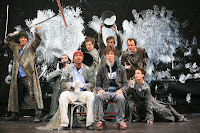
The defective brakes recall that has torpedoed Toyota Corporation delivers an ironic punch line to “Tori no tobu takasa”, the tale of a family-owned toilet seat manufacturer’s struggle to join the global economy. Trading a merely model product for sexy marketing, the Saruwatari company aspires to pamper the derrieres of all of Asia, but loses its integrity in the process. This Sino-French production of Michel Vinaver’s landmark play about France’s collision with free enterprise in the 1960s, “Par-dessus bord”, is adapted by the Japanese playwright Oriza Hirata and directed by a passionate reader of both, Arnaud Meunier. The largely satisfying results show however, in the parlance of Vinaver’s play, that “extending the product” may require eliminating some “clutter” for “profit potential” to be “maximized”.
“Par-dessus bord” is a detailed study (in four versions of varying lengths) of how French business was transformed in the 1960s by American corporate practices, written by someone who lived these changes from the inside (Vinaver was the CEO of Gillette France at the time) and who saw in these the makings of Aristophanic dramatic structure and comedy. “Tori no tobu takasa” follows faithfully the six movements of Vinaver’s text, changing only toilet paper for toilet seats and Yankee ad men for Parisian “consultants marketing”. A third modification, concerning a subplot around a “mixed” couple, replaces the young Jewish lover with a Rwandan exile.
Despite the incongruousness of this latter change (unlike French Jews, assimilated Africans are an exception in Japanese society) and the didacticism it generates, as well as the lengthy parallel between mythological and modern Japan (the nuances of which are difficult to capture for the uninitiated to Japanese origin stories, who also have to read subtitles), this contemporary ride on the roller coaster of the market economy remains fast and funny. The multicultural project marshals the resources of an abundant crew and cast, who, like so many legions of Tokyo commuters, crisscross the stage in perpetual motion: moving the set, singing and dancing for the glory of toilet seats, and, most of all, incarnating with wry humor Saruwatari’s furiously busy employees and their smoothly clever French associates.
Oriza Hirata is the leading playwright of his generation in Japan, the founder of the Seinendan company and the theory behind the “quiet theater” movement of the 1990s, which seeks inspiration in contemporary Japanese society and carries a meticulous acting methodology. Somewhat like Vinaver’s straddling of business and theater, Hirata is developing the field of “communication design”, meant to facilitate through architecture and interior clues, the exchange of information between doctors and lawyers on the one hand, and their patients and clients, on the other. As the set sheds its bare wooden walls and patriotic red offices in favor of modular spaces and the shimmering blues of computer screens, Hirata’s interests appear fully connected to the subject at hand. The Japanese are the uncontested world experts when it comes to toilet technology and comfort, but that it would take French marketing savvy in the areas of beauty and bien-être to sell seats in 2009 satisfyingly explains the cultural transfers from the original. As Saruwatari makes room for French investors by pushing faithful employees out the door, the future looks a little too bright and the promises made about ensuring “Japanese” quality above all sound deliberately hollow. A lesson that Toyota is learning the hard way, as are the clients of global markets all around the world, every day.
In French and Japanese, with French subtitles. To Feb. 20, Tues-Sat, 8:30 pm, Théâtre des Abbessess, 31 rue des Abbesses, 18e, M° Abbesses, 12€-23€, tel: 01.42.74.22.77.
Photo credit: Théâtre de la Ville
